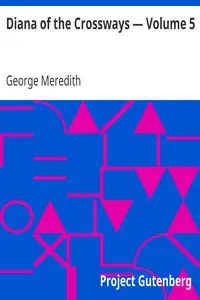"Sandra Belloni — Volume 2" by George Meredith unfolds in the late 1800s, chronicling lives intertwined with personal struggles and social dynamics, all while offering insight into romantic notions. Wilfrid Pole stands as a pivotal figure, his emotional battles and evolving relationships steering the course of the story. The narrative shifts between comedic moments, heartfelt emotions, and social commentary, notably addressing the rigid British class structure and its impact on personal connections. The story begins with young men from the Hillford Club setting out to engage with rivals, yet their meeting descends into drunken disarray. Wilfrid is shown dealing with his feelings for Emilia. The interactions lead to clashes, highlighting both humorous and turbulent facets of social interactions during that era. Emilia’s emotional struggles and her relationships with Wilfrid and Captain Gambier point to more complex explorations of love, status, and human connections that will develop in the story.

Sandra Belloni — Volume 2
By George Meredith
Amidst social clashes and emotional turmoil in old Britain, a man's affections for a bewitching woman set the stage for a tumultuous exploration of love and reputation.
Summary
About the AuthorGeorge Meredith was an English novelist and poet of the Victorian era. At first, his focus was poetry, influenced by John Keats among others, but Meredith gradually established a reputation as a novelist. The Ordeal of Richard Feverel (1859) briefly scandalised Victorian literary circles. Of his later novels, the most enduring is The Egoist (1879), though in his lifetime his greatest success was Diana of the Crossways (1885). His novels were innovative in their attention to characters' psychology, and also portrayed social change. His style, in both poetry and prose, was noted for its syntactic complexity; Oscar Wilde likened it to "chaos illumined by brilliant flashes of lightning". Meredith was an encourager of other novelists, as well as an influence on them; among those to benefit were Robert Louis Stevenson and George Gissing. Meredith was nominated for the Nobel Prize in Literature seven times.
George Meredith was an English novelist and poet of the Victorian era. At first, his focus was poetry, influenced by John Keats among others, but Meredith gradually established a reputation as a novelist. The Ordeal of Richard Feverel (1859) briefly scandalised Victorian literary circles. Of his later novels, the most enduring is The Egoist (1879), though in his lifetime his greatest success was Diana of the Crossways (1885). His novels were innovative in their attention to characters' psychology, and also portrayed social change. His style, in both poetry and prose, was noted for its syntactic complexity; Oscar Wilde likened it to "chaos illumined by brilliant flashes of lightning". Meredith was an encourager of other novelists, as well as an influence on them; among those to benefit were Robert Louis Stevenson and George Gissing. Meredith was nominated for the Nobel Prize in Literature seven times.












